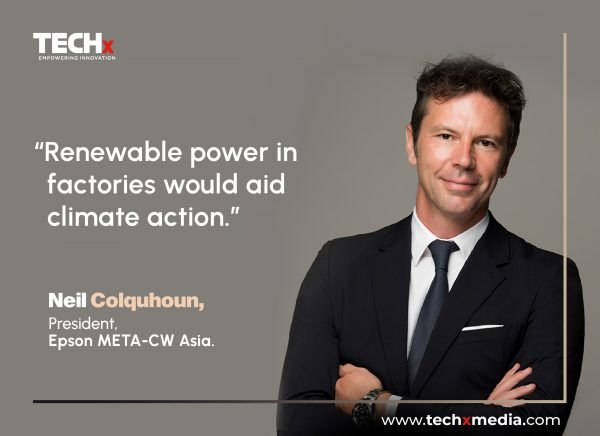23 December 2024, Mon |
2:52 AM

Seiko Epson Corporation, a global technology company specializing in innovative solutions for home and office, commercial and industrial applications, is on a mission to inspire companies to transition to 100% renewable energy by sharing valuable insights from its own journey.
According to the International Energy Agency, manufacturing and other industrial users account for approximately one-third of global energy consumption, with electricity playing a crucial role. Epson successfully completed its transition to renewable electricity in Japan in 2021 and aims to achieve this goal across all Epson-owned sites globally by the end of 2023, paving the way for others to follow in renewable manufacturing.
Neil Colquhoun, President of Epson META-CW Asia, emphasized the impact of renewable energy on combating climate change. “If all the power consumed by factories and industrial plants came from renewable sources, it would significantly contribute to tackling climate change. Although it’s a challenging target, companies are increasingly committing to it. By sourcing locally produced energy, companies can harness abundant renewable resources, enhance energy self-sufficiency, and create jobs.”
In the GCC, nations are making substantial investments in sustainable development to boost economic growth, supported by frameworks aimed at reducing carbon footprints. As highlighted in a recent World Bank Blogs article, countries in the region are pursuing ambitious targets for renewable energy generation. Notably, Saudi Arabia aims for 50% of its energy mix to come from renewable sources by 2030, while Oman targets 30% from renewables by the same year. The UAE, home to some of the world’s largest and most cost-effective solar plants, has also unveiled a Hydrogen Leadership Roadmap.
Four Strategies for Transitioning to Renewable Energy
Epson recommends several practical strategies for companies looking to transition to renewable energy:
1. Sourcing Renewable Electricity: Engage local suppliers through contracts with electricity providers. The feasibility of this approach varies by country, but it can ensure that electricity consumption comes from renewable sources.
2. Generating On-Site Electricity: Implement rooftop solar panels or wind turbines if space permits. Even partial power generation can make a meaningful contribution.
3. Develop Battery Storage Facilities: Address concerns about the reliability of renewable energy sources by investing in storage technology, ensuring power supply during non-generating periods.
4. Evaluate Solar Power Generation Options: Decide between self-investment and power purchase agreements (PPAs) for solar power systems based on the specific conditions of each country or region. A tailored combination of these strategies can significantly aid manufacturers in achieving their renewable energy goals.
By adopting these strategies, companies can take significant steps towards sustainable practices and contribute to a greener future.